Pennsylvania Service Dog Requirements

Residents of Pennsylvania who require a service dog are legally recognized under federal and state law. The ADA and the Pennsylvania Human Relations Act protect owners of service dogs in the Keystone State.
Service dogs in Pennsylvania must be allowed in areas open to the public, even if there is a policy that prohibits entry to normal dogs. Read on to learn more about service dog rights and requirements in Pennsylvania.
Health Requirements
To own a service dog, the handler must have an eligible physical or mental health disability. A “disability” is defined as a physical or mental impairment that substantially limits a major life activity (such as the ability to work, socialize or attend school).
Physical disabilities include health issues like visual impairment, seizures, and hearing loss.
Psychiatric disabilities include conditions like severe depression, chronic anxiety, PTSD, autism, and learning disabilities. Service dogs used for mental health conditions are known as psychiatric service dogs.
Training Requirements
It is not enough just to have a qualifying disability. A service dog must also perform a job or task directly related to the handler’s condition.
Service dogs are called upon to perform countless jobs. Tasks for physical disabilities include actions like pulling wheelchairs, guiding people who are blind, and providing seizure assistance.
Tasks for psychiatric disabilities include retrieving medication, providing tactile stimulation during moments of crisis, calming the owner during panic attacks, and buffering in crowded environments.
In Pennsylvania, you can train a service dog by yourself or with the help of a professional trainer. Many handlers prefer to do part or all of the training to develop a deeper bond with their animal.
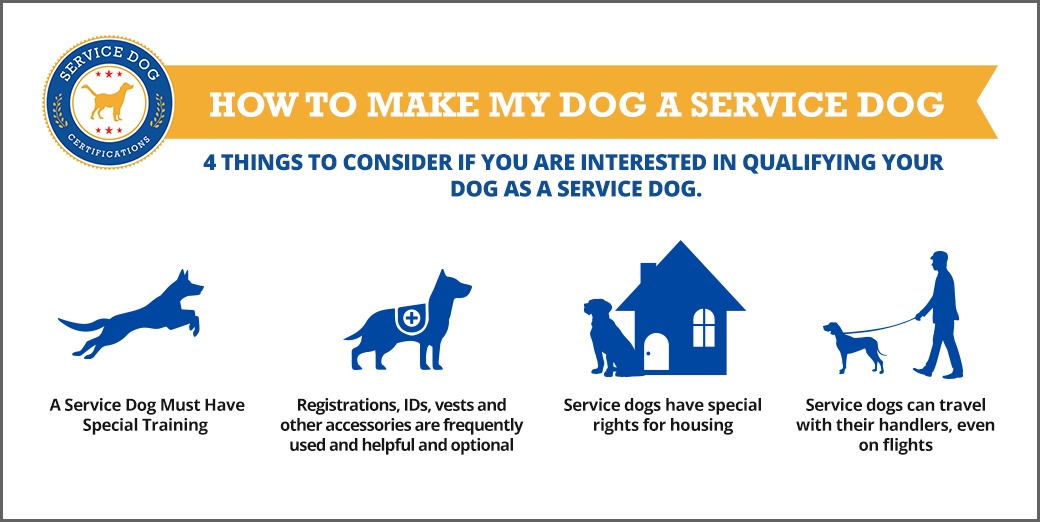
Identification Requirements for Service Dogs in Pennsylvania
Most service dog owners use service dog paraphernalia like ID cards, vests, tags, and certificates to signal to others in public that their dog is special.
You are not required to have these items in Pennsylvania to demonstrate that you own a service dog. These items, however, can prevent unwanted interactions and interference with your dog while on duty. Service dog owners prefer to use these items so others can easily identify their dog as a service dog, not a regular pet.
Stores, restaurants, and other public venues in Pennsylvania can verify a service dog by asking two questions when the disability is not obvious: 1. Is the animal a service dog required for a disability? and 2. What work or task has the service dog been trained to perform?
Service Dog Registration in Pennsylvania
Registering a service dog in Pennsylvania is optional. You may have to register your dog if there is a local rule that requires registration of all dogs in a jurisdiction, but no service dog-specific registration is necessary.
Service dog owners, however, choose to voluntarily register their dogs for several reasons. Registering a service dog with a service like Service Dog Certifications enters the dog’s information into a searchable database linked to an ID card.
The ID card can be used to show others that you own a service dog or be presented for convenience when third parties unaware of service dog verification rules continually demand documentation.
Psychiatric Service Dog Requirements
Most people associate service dogs with the type that assist with physical disabilities. However, many service dogs help with invisible disabilities in the form of psychiatric illnesses.
In Pennsylvania, psychiatric service dogs have the same legal rights as other types of service dogs. They are just as important to their handlers for managing their health condition.
Psychiatric service dogs perform an incredible variety of tasks, including the following:
- Deep pressure therapy
- Reminding the owner to take medication
- Posting and watching the owner’s back in open areas
- Tactile stimulation
- Alerting the owner to oncoming threats or episodes
- Disrupting repetitive self-destructive behaviors
Where can service dogs go in Pennsylvania?
Service dogs in Pennsylvania are allowed to accompany their owners in public areas that don’t allow pets. For example, a handler can bring their service dog to:
- Restaurants
- Shops
- Hospitals
- Schools
- Hotels
Service dogs also have housing rights. They must be allowed to live with their owners, even in buildings that don’t allow dogs.
Service dogs can also go into airports in Pennsylvania and board flights with their handlers free of charge. Flying with a service dog requires specific documentation to be submitted to the airline before boarding.
No matter where a handler takes a service dog, it must always be under the full control of its handler. A service dog that is acting unruly, aggressive, or threatening the health and safety of others can be asked to leave the premises.
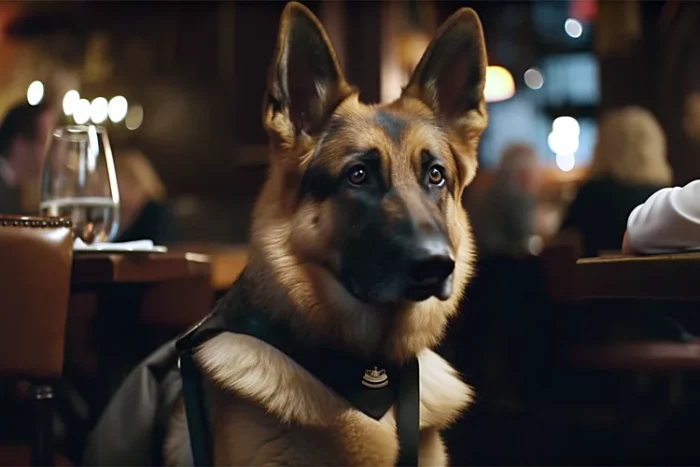
Emotional Support Animals in Pennsylvania
Pennsylvania also recognizes another type of assistance animal – emotional support animals. ESAs are similar to psychiatric service dogs in that they help with mental health conditions. However, unlike service dogs, ESAs do not require specialized training.
Emotional support animals also have more limited rights. They are allowed to live with their owners free of charge in no-pets housing, but they do not have broader public access rights.
Another difference between ESAs and service dogs is that an ESA can be an animal other than a dog. While service animals are limited to dogs, ESAs can be dogs, cats, birds, gerbils, fish, turtles, and other small household pets.
To qualify for an ESA in Pennsylvania, the tenant must provide a signed ESA letter from a healthcare professional licensed for Pennsylvania.
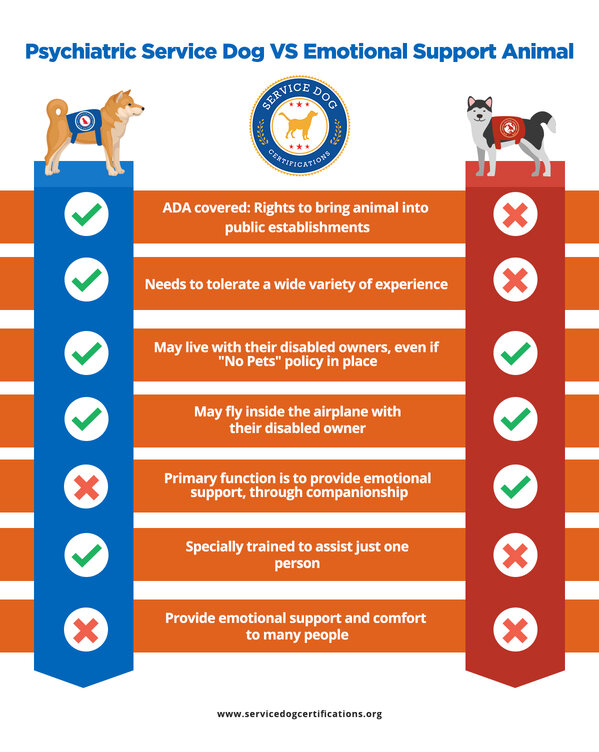
Service Dog Legal Developments in Pennsylvania
In 2018, Pennsylvania passed the Assistance Animal and Service Animal Integrity Act. This law recognizes the importance of service dogs and emotional support animals in the state. The bill was also intended to prevent individuals from fraudulently representing that their animal is a service dog or emotional support animal without the proper qualifications.
Violating the rights of a service dog owner in Pennsylvania can have legal consequences. For example, in a recent case, a 16-year-old girl successfully sued her school for failing to properly accommodate her service dog and won a $100,000 settlement.
About the Author: The writing team at Service Dog Certifications is made up of folks who really know their stuff when it comes to disability laws and assistance animals. Many of our writers and editors have service dogs themselves and share insights from their own experiences. All of us have a passion for disability rights and animals.
13 comments
Leave a Reply Cancel reply
Latest Posts
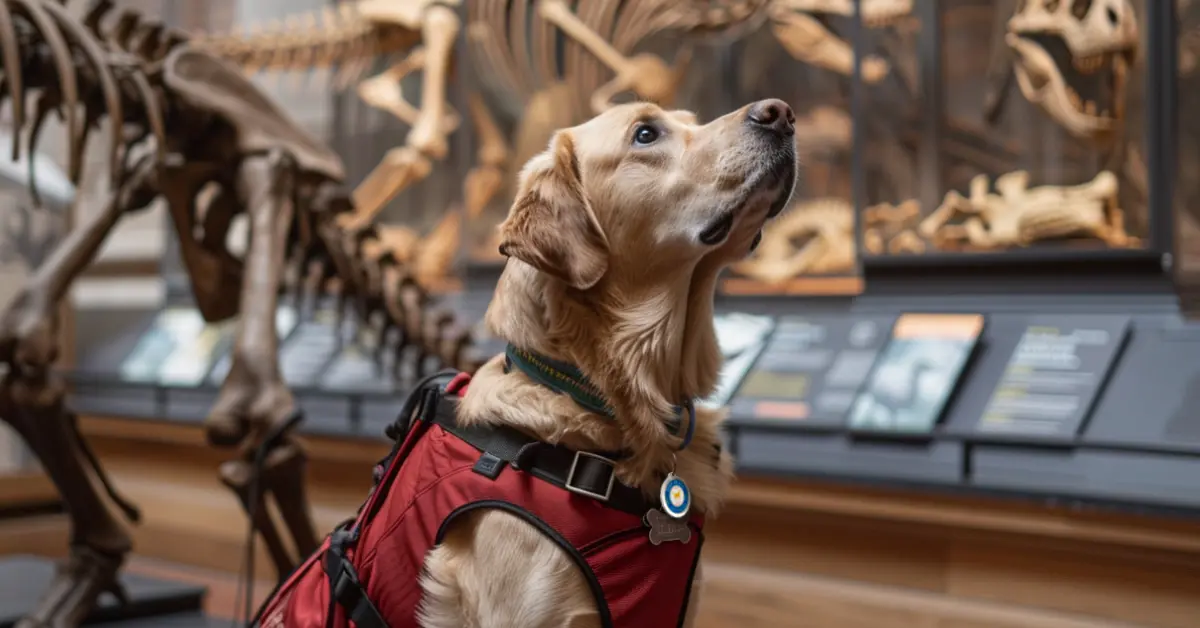
Can you bring a service dog to a museum?
Yes, you can bring your service dog to the museum! All the major U.S. museums welcome guests with service animals in accordance with the Americans with Disabilities Act (ADA). There are some areas, however, that might be off-limits. Here’s what you should know if you plan to spend a day at the museum with your […]

Read More
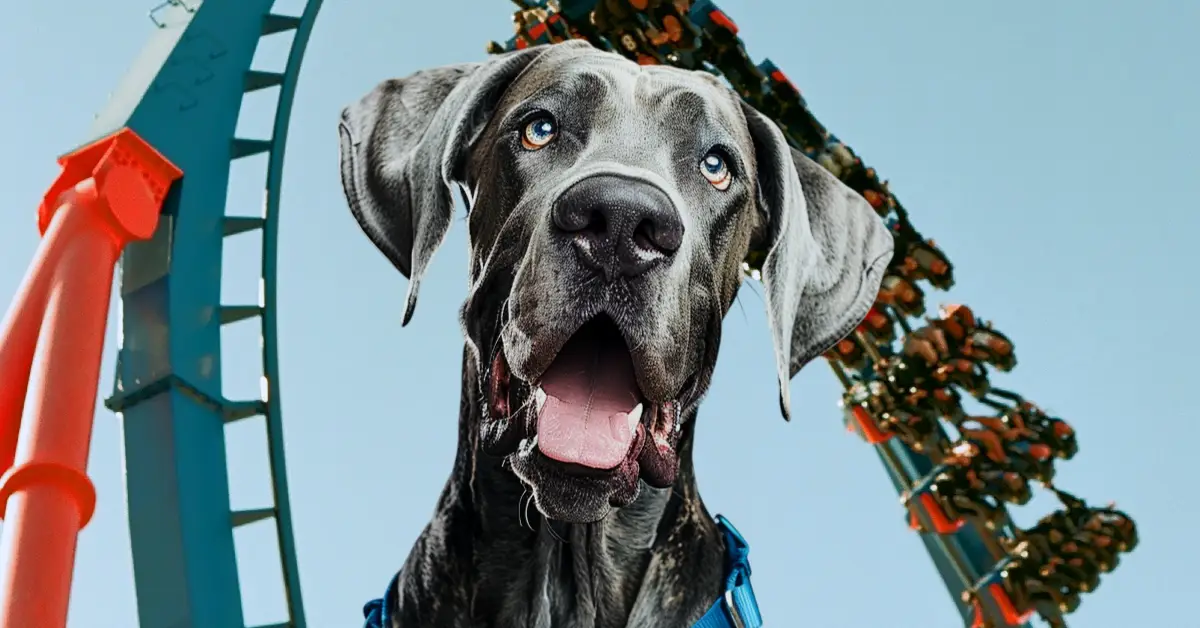
How to Bring a Service Dog to Six Flags Magic Mountain
Service dogs are welcome at Six Flags Magic Mountain so long as they are, according to Six Flags, “trained to do work or perform tasks for people with disabilities.” Of course, your dog must be housebroken and remain on a leash or harness and under your control while at the park — and the park […]

Read More
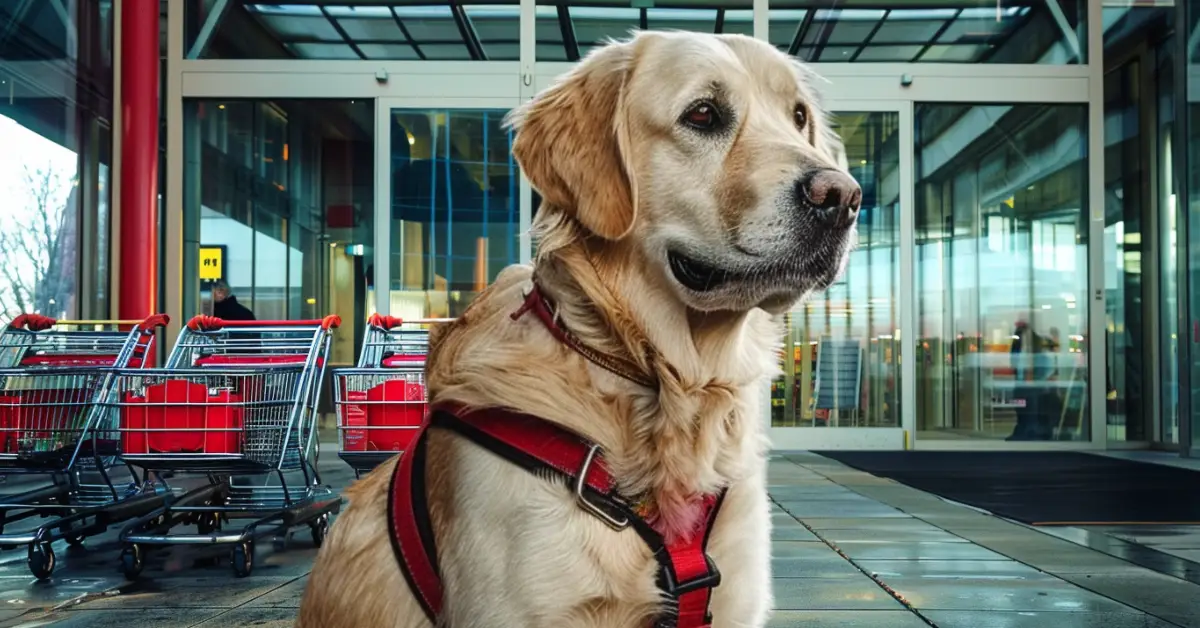
When Stores Can Refuse Your Service Dog
According to the Americans with Disabilities Act (ADA), service dogs should be allowed into any store most of the time. A store owner can legally exclude a service dog if they are actively growling, snapping at, or frightening customers, or if the dog is obviously out of the control of its owner. Ordinary behaviors — […]

Read More



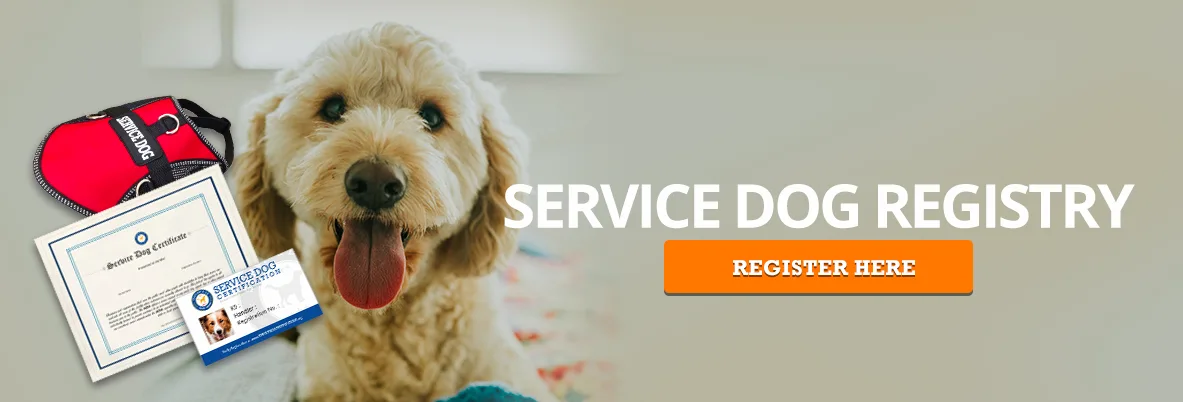
You need to correct the article. Pennsylvania’s laws treat an SDIT the same as an SD in access, as well the SDIT is under the same behavorial expectations as a SD.
Thank you for pointing that out. The ADA does not give service dogs in training full access rights, but certain states do.
Does a Service Dog need any training or paperwork that states that the dog is a “Certified Service Dog”? Or can any Tom, Dick or Harry just say, Hey, look! I have a Service Dog because I bought a little vest that says ‘Service Dog’ on it.” And if that’s the case, who is responsible when this guy’s pit bull, that has a little vest with the words “Service Dog” on it, mauls a child? The school district can be sued by asking the guy to show his dog was a Service Dog and they can be sued by not checking the status of this “Service Dog”. Looks like a lose/lose situation for the school district…right?
There is no documentation requirement for service dogs (other than the DOT Service Animal Form when flying). Third parties can verify a service dog under the ADA by asking two questions (and only if the disability related need for the service dog is not obvious): 1. Is the dog a service dog required for a disability? and 2. What work or task has the dog been trained to perform? In the scenario you described, the owner would be responsible if their dog harmed another person. Service dogs are highly trained animals and should never have behavioral problems that would lead them to attack a person.
They have to be task trained and under the control of handler if they are not or a threat they can be kicked out and handler would be legally responsible for any injuries
I have trailed my service dog to assist me with my two disabilities: 1. I am an insulin dependent diabetic at which time if my bs goes above 250 he notifies me. He carries my medications and glucose supplements as needed.
2. I have a bone on bone deteriorating ankle and he helped me maintain my balance by keeping along side of me or should I slip out of a chair or other means end up on the ground he comes beside me and lets me use him as my support. Further he is trained in a non combatantly way to help me if he thinks someone is going to harm me. My question is I am being asked by the humane society officer and a district justice to produce a certification form. He at all times when in public wears a sd vest and is tethered and has been trained in over 60 commands and commands specific to my disabilities. I carry a doctor’s letter with me, stating his feeling that I need a service animal and he is chipped, viewed by a vet yearly and up to date with all required meds. Further he is insured. Certified by a national kennel club and he carries a life time license under the county dog ordinance for disabled individuals and senior citizens. My question is this justifiable or do I need some other form of certification in Pennsylvania, and if so where do I get it.
You do not need a certification form to prove that you have a service dog under the ADA. Generally, other than the DOT Service Animal Air Transportation Form, documents are not required to be eligible for service dog access rights.
Does the person who the service dog is serving, need to be own by the person they are servicing?
Service dogs are usually trained to specifically help one handler.
Can an employer deny employment because they don’t allow dogs at the work place?
Employers are certainly allowed to prohibit dogs at the workplace. They must however make accommodations for service dogs under the ADA.
If an employee has trained the service dog themselves and requests an accommodation for the service dog from the employer, can the employer request to have a professional assessment done on the dog to verify that the dog performs as a service dog for the accommodations being requested.
That would be an unusual request. ADA rules generally only allow others to ask service dog owners two questions for validation: 1. Is the dog a service dog required for a disability? and 2. What work or task has the dog been trained to perform?